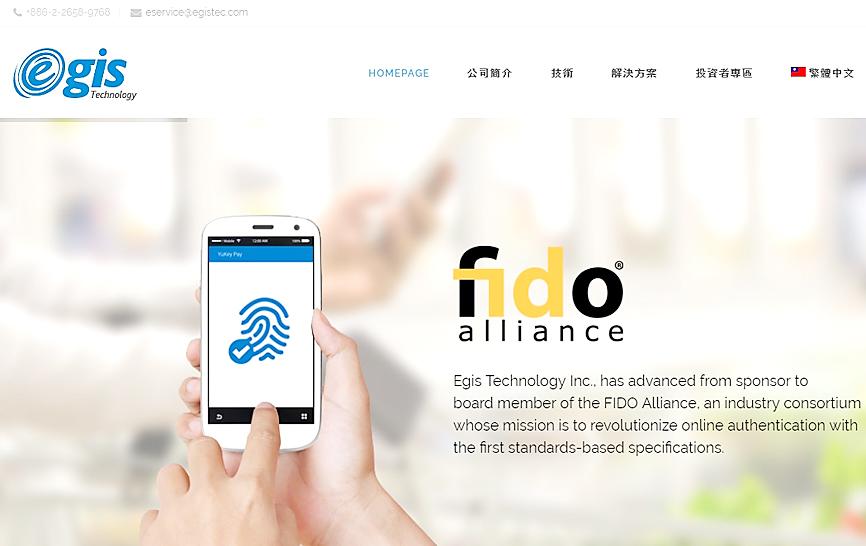Egis Technology Inc (神盾), the world’s second-biggest fingerprint sensor supplier, yesterday said that it has secured orders to supply its products to South Korea’s Hyundai Motor Co and its affiliate, Kia Motors Corp, in its latest bid to expand its presence in the higher-margin automotive components segment.
In a statement, the firm said that since May, it has been shipping fingerprint sensor products for Hyundai’s Genesis models and Kia’s new flagship K9 sedans.
Egis’ fingerprint sensors are used in vehicle activation and unlocking on Kia vehicles, along with the Kia Pay system, replacing the previous password mode, the statement said.

Photo: Screen grab from Egis Technology Inc’s Web site
Kia’s fingerprint recognition system allows vehicle owners to personalize settings.
When Kia owners start their vehicle using Egis’ fingerprint sensor, the feature automatically adjusts the seat position, side and back mirrors, internal temperature and dashboard, the statement said.
The personalized fingerprint recognition system can be connected to a payment function, Kia Pay, replacing the password with biometrics to authorize the payments, it added.
Over the past few years, Egis, which supplies fingerprint sensors to Samsung Electronics Co, as well as Oppo Mobile Telecommunications Corp (歐珀) and other Chinese phone makers, has found applications for its fingerprint sensors in segments other than smartphones.
To generate new growth, it has expanded product lineups beyond fingerprint sensors, even as the COVID-19 pandemic has hit revenue and disrupted supply chains.
The firm’s revenue last year fell 15 percent to NT$6.22 billion (US$222.17 million), or earnings per share of NT$9.14, down from NT$12.6 in 2019.
Revenue in the first six months of this year continued to trend downward, declining 42.77 percent to NT$1.82 billion, compared with NT$3.17 billion in the same period last year.
Egis shareholders on Monday voted to distribute a cash dividend of NT$15 per share.
Separately yesterday, chip testing and packaging service provider King Yuan Electronics Co (京元電子) said that its board of directors approved to increase this year’s capital expenditure for the company and its subsidiary to NT$16 billion — the highest in the company’s history.
The new amount is 70 percent more than the NT$9.38 billion previously budgeted by the firm, King Yuan said in a regulatory filing.
The firm plans to use the capital to expand its manufacturing capacity in Taiwan and China, while meeting demand from customers and market conditions, it added.
King Yuan last week reported revenue of NT$1.98 billion for last month, a monthly decline of 30.86 percent and an annual decline of 20.52 percent.
The company’s revenue last month was its lowest in 26 consecutive months, as King Yuan’s operations were affected by a temporary quarantine of workers due to a cluster of COVID-19 infections at its plant in Miaoli County’s Jhunan Township (竹南).
In the first six months of this year, cumulative revenue increased 3.88 percent year-on-year to NT$15.23 billion, company data showed.
Additional reporting by staff writer

UNCERTAINTY: Innolux activated a stringent supply chain management mechanism, as it did during the COVID-19 pandemic, to ensure optimal inventory levels for customers Flat-panel display makers AUO Corp (友達) and Innolux Corp (群創) yesterday said that about 12 to 20 percent of their display business is at risk of potential US tariffs and that they would relocate production or shipment destinations to mitigate the levies’ effects. US tariffs would have a direct impact of US$200 million on AUO’s revenue, company chairman Paul Peng (彭雙浪) told reporters on the sidelines of the Touch Taiwan trade show in Taipei yesterday. That would make up about 12 percent of the company’s overall revenue. To cope with the tariff uncertainty, AUO plans to allocate its production to manufacturing facilities in

TAKING STOCK: A Taiwanese cookware firm in Vietnam urged customers to assess inventory or place orders early so shipments can reach the US while tariffs are paused Taiwanese businesses in Vietnam are exploring alternatives after the White House imposed a 46 percent import duty on Vietnamese goods, following US President Donald Trump’s announcement of “reciprocal” tariffs on the US’ trading partners. Lo Shih-liang (羅世良), chairman of Brico Industry Co (裕茂工業), a Taiwanese company that manufactures cast iron cookware and stove components in Vietnam, said that more than 40 percent of his business was tied to the US market, describing the constant US policy shifts as an emotional roller coaster. “I work during the day and stay up all night watching the news. I’ve been following US news until 3am

COLLABORATION: Given Taiwan’s key position in global supply chains, the US firm is discussing strategies with local partners and clients to deal with global uncertainties Advanced Micro Devices Inc (AMD) yesterday said it is meeting with local ecosystem partners, including Taiwan Semiconductor Manufacturing Co (TSMC, 台積電), to discuss strategies, including long-term manufacturing, to navigate uncertainties such as US tariffs, as Taiwan occupies an important position in global supply chains. AMD chief executive officer Lisa Su (蘇姿丰) told reporters that Taiwan is an important part of the chip designer’s ecosystem and she is discussing with partners and customers in Taiwan to forge strong collaborations on different areas during this critical period. AMD has just become the first artificial-intelligence (AI) server chip customer of TSMC to utilize its advanced

Six years ago, LVMH’s billionaire CEO Bernard Arnault and US President Donald Trump cut the blue ribbon on a factory in rural Texas that would make designer handbags for Louis Vuitton, one of the world’s best-known luxury brands. However, since the high-profile opening, the factory has faced a host of problems limiting production, 11 former Louis Vuitton employees said. The site has consistently ranked among the worst-performing for Louis Vuitton globally, “significantly” underperforming other facilities, said three former Louis Vuitton workers and a senior industry source, who cited internal rankings shared with staff. The plant’s problems — which have not